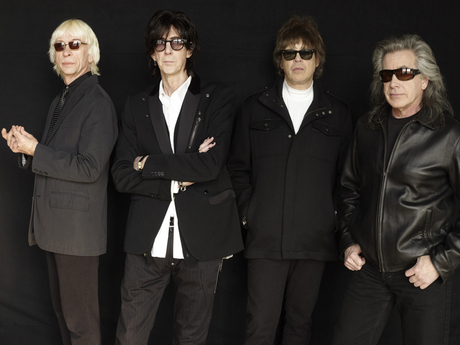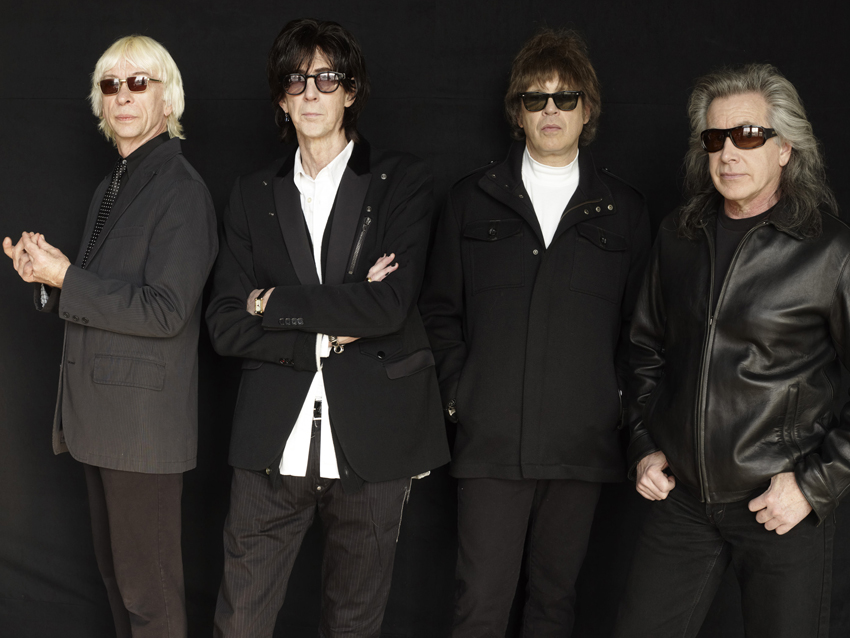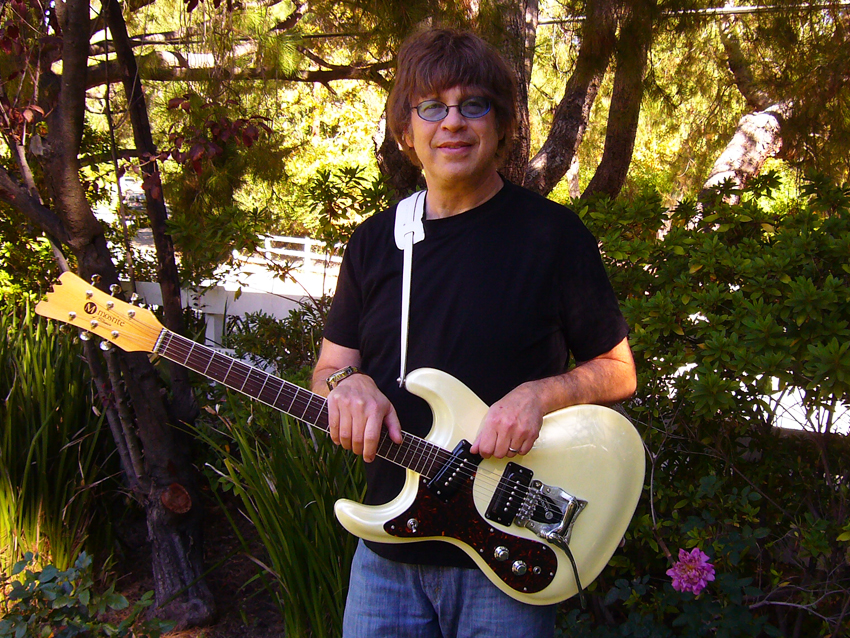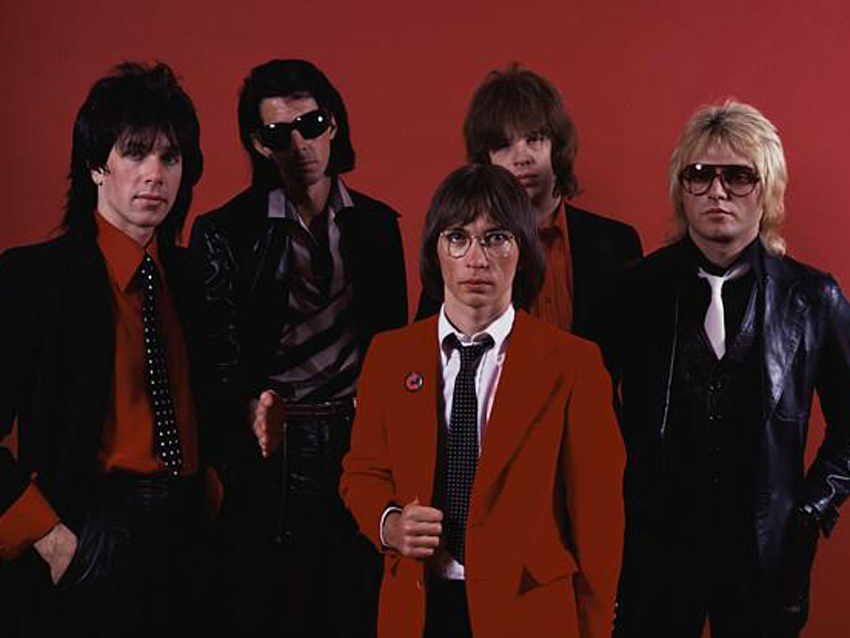

The Cars, 2011 (from left): Greg Hawkes, Ric Ocasek, Elliot Easton and David Robinson.
"I'm really proud of my contribution to the sound of The Cars," says guitarist Elliot Easton. "We had a lot of hits during a certain period, and those songs all hold up. You hear them today, and they still sound terrific. I like to think that my guitar playing had a little something to do with it. But the bottom line is that they're great songs. I think we have a bunch on this record, too."
The album Easton is referring to is Move Like This, due out 10 May on Concord Music, which sees the reunited band (singer-guitarist Ric Ocasek, keyboardist Greg Hawkes, drummer David Robinson and Easton; sadly, bassist and co-lead singer Benjamin Orr died in 2000), which burst out of Boston's late '70s new wave scene and practically defined radio pop-rock during the next decade with smashes like My Best Friend's Girl, Just What I Needed, Candy-O, Shake It Up, You Might Think, Magic, Drive - fuggedaboudit, the list goes on and on - sounding as hooktastic as ever.
Although Move Like This can roughly be split in half - five songs were produced by the band at Millbrook Studios in Millbrook, New York, with the remaining five helmed by Garret 'Jacknife' Lee (known for his work with acts such as U2, Weezer, Snow Patrol and REM, among others) - it's a seamless, one-listen winner, full of glittering rockers like Sad Song (which is anything but), Free and Blue Tip to haunting ballads such as Soon and Take Another Look.
That a celebrated band can get in a room and manage to conjure up a familiar noise is nothing new - the cash-in circuit has seen plenty of them. But it's quite another thing for a group that hasn't seen the insides of a recording studio together in almost a quarter century (The Cars' last effort was 1987's Door To Door) to literally re-imagine themselves, all the while keeping their essential elements - power pop, garage rock, synth pop, rockabilly, bubblegum, art rock - intact. That's a neat trick, indeed, and The Cars in 2011 have pulled it off admirably.
"We're all really glad we made this album," says Easton. "Has it been a long time in coming? I guess you could say so." Stifling a 'duh'-like laugh, the southpaw guitarist says, "But at least we came together for the right reasons, to make some cool music with one another again. That's what we did way back when, and if we can give people some new tunes to remember us by, hey...that's not a bad thing in my book. Hopefully, there will be more."
The Cars reuniting is one of those events that many music fans never dreamed would ever happen. What led to you guys finally getting back together?
Want all the hottest music and gear news, reviews, deals, features and more, direct to your inbox? Sign up here.
"My recollection of things is that I felt that a good amount of time had passed, and I hadn't spoken to Ric in a while. So one day I just picked up the phone to call an old friend, you know? Ric and I chatted, and it was nice. I asked him what he was doing, and he said he was writing songs. He said they were kind of different from other things he had written before, but he was very excited. I asked him what he was going to do with the songs, and he said, 'I'll probably make another solo record.' So I said, 'Why don't we make a Cars record?' [laughs]
"I don't know if he'll remember it the same way, but that's my recollection of it. Then I guess he thought about it for a few weeks and called around to David and Greg, and everybody was up for the idea. Suddenly, it was like, 'Yeah, let's do that!'"
Several years ago, of course, you and Greg had put together The New Cars, which David wasn't a part of.
"Right. Well, David is a very loyal guy, and he just felt that The Cars are a band of five particular people. If those people weren't all to be involved, he opted to bow out. I respected that decision."
So once David found out that it was to be the original band - of course, Ben couldn't be involved - he was interested.
"Then he was interested, yes. Obviously, as you said, Ben couldn't be involved. When it came time to think about working together as The Cars, there was never any question that it would be just the four of us. We weren't going to bring anyone else in to the band.
"It was hard not having Ben around. There were many, many times when we all missed him. I remember when we used to do background vocals, for instance - and it was usually Ben, Greg and myself standing around a mic - so during those times on this record when we did background parts, it felt very strange not to have Ben there. There are so many other things, too - his sense of humor, his bass playing… He was just a great guy. Everything about him, everything he did…it was all missed."
Without Ben, I guess there was no way you could even try to go back to being the old band, was there?
"That's an interesting question. The fact of the matter is, with Ben or without Ben, when the four of us started playing, we really did feel like The Cars. Even when we went up to the studio in Millbrook, New York, just to sit around and talk, it felt like The Cars. The old humor, the chatting and catching up…it was like family getting together. You know that feeling you get when you don't see a relative for a number of years, but when you do, you pick up right where you left off? That's what it was like.
"Of course, I wish that Ben were still with us. We all wished that. That would've wonderful. But, like I said, when the four of us started playing, we were The Cars. And it happened fast, too. We fell into place, just like in the old days."
What led to the decision to have Greg play bass? Was it, like you said, not wanting to bring anybody else into the band?
"Yeah. We didn't want to bring anybody from the outside in. Our feeling was, This is The Cars; these are the four people that are left in the band. We didn't want to try to replace Ben, because that would've been impossible. In the studio, we had the ability to overdub, so there was no reason to get a session player or anything like that. Live, that's something we'll have to figure out."
As always, Ric is the primary songwriter. I'm curious, though: How much does he let the band help shape the tunes, whether in the rehearsal or recording studio?
"Quite a bit, actually. Once he shows a song to the band and we start playing it, we'll all come up with ideas. Some will stick, and others won't. We'll sort of hammer things out, like with any band. But Ric has the ultimate word - after all, he's the writer and has the vision for what the song is supposed to be. We're all just trying to get inside that and complement that, in whatever ways we can."
You mentioned that you'll figure out what to do live as far as a bass player. What about the songs that Ben sang? Will somebody else be singing those?
"No. Ric will sing them all. He wrote them, and we were lucky enough to have two lead singers for all of those years - most bands have just one lead singer. [laughs] It might be a lot of work for Ric, because he'll be singing a lot more than he used to during previous tours and shows. He'll do a beautiful job on all of those songs."
What was it like working with Jacknife Lee? I know he's been a big fan of the band.
"He was very easy to get along with. An extremely nice person, highly intelligent, entirely respectful of the band. Garret knew what we were trying to do, and he just got into it. In some ways, he became that fifth member of the band. He had our trust, we had his trust, and we just put our heads together to do whatever it took to make a great record. He did a wonderful job of assembling all of that enthusiasm to doing just that, making a terrific recording."
Some of the tracks have references to classic Cars tunes, the biggest example being Sad Song - you hear those handclaps and you're right in My Best Friend's Girl mode. [Easton laughs] Intentional?
"I never even thought of it before."
Really? You're kidding.
"No. I guess not. [laughs] A lot of songs have handclaps."
Well, there's also the guitar intro, too… [Easton doesn't answer] Wait a second, you don't hear this at all?
"Hold on, I have it right here. [Easton dials the track up on his iPod, listens] Oh, I see what you mean! Yeah. But you know, it's a different tempo and a different vibe. I guess I never really thought about it. I just thought about it as the setup to the song.
"You know, being in The Cars and being inside the band, we have our references, and things do come up. But it's not always conscious. Sometimes, most of the time, it's very innocent. A handclap can just be a handclap - a good way to set up the verse. I don't think it was ever intended as an homage to another song - not from my point of view."
Well, what about your solo in the song Keep On Knocking? To me, it recalls the extended guitar break you did in You're All I've Got Tonight. [Easton laughs] I take it from your reaction that you don't hear this, as well.
"I don't know. I don't over-intellectualize this stuff. When it came time to put a solo on the song, it was just an approach I tried. I wanted to do something with more of a rounded vocal tone instead of a harsh, biting tone. I wasn't thinking of You're All I've Got Tonight. [laughs] I wish I could say, 'Man, that's right on the money.' You know, Joe, maybe it just comes down to the simple fact that it's the same guy playing both solos. It's just the way I hear the solos and play them."

Easton, outstanding in his field, with his left-handed Mosrite. © Sydney Easton
You get some nice guitar crunch in the song Free. Are you using traditional amplifiers and stompboxes, or have you been dabbling with amp modeling software and devices?
"We used mostly amps and stompboxes. I had a big bag of full pedals, as did Garret - we sort of spread them out on the control room floor and pulled out what we thought would sound good. We did a lot of straight miking of amps. Come to think of it, a lot of the amps we used were on the small side.
"I really liked using one of those Vox AC15 Hand-Wired Series amps - you know, one of the white ones with the TV front and the pentode/triode switch. That was a fabulous amp. I also used a Princeton Reverb and a Deluxe Reverb. I'm trying to think of what else we used…[pauses] Oh, Garret had an old English Selmer and a Vox AC30. I really liked the AC30.
"Those are basically the amps I used for the songs we did with Garret in Los Angeles. There were the other batch of tunes we did in upstate New York, and for those sessions I didn't bring any amps with me. I just flew out with some guitars and effects. The studio had a really great collection of gear, with probably every cool little Ampeg and combo amp you'd want to try. In the control room, there was a wall of amp heads with a switcher box, and out in the big room where we'd play were two different 4x12s loaded with different speakers. So I could choose any head and have them go through one or two different cabinets. Having all of those sound possibilities at my disposal was pretty great."
I know you have probably one of the most extensive collections of left-handed guitars around. But what were the main guitars that you used for the album?
"I would say my signature model SG. Then there was a Gibson Historic Collection 1963 ES-335 that I loaded with Lindy Fralin True 60 pickups and TonePros hardware. I'll tell you, those pickups, the True 60 humbuckers by Lindy Fralin for RS Guitarworks, they're really incredible. I have them in a couple of guitars, and they're unbelievable - really sweet-sounding humbuckers.
"I also played a Fender Custom Shop Nocaster. I had one built for me with a slim neck because they usually have baseball bat necks - that's what they're known for. I played a Custom Shop white Strat, like a real Henrix-y kind of model - that was cool. Let's see… I played a Phantom 12-string. Then there was a Martin D-28V, the vintage-style model. I might have played my Mosrite a little bit. I've really been getting into the Mosrite lately; it's such a cool guitar. Basically, it was a collection of Fenders and Gibsons, nothing too crazy. Occasionally, there'd be the oddball guitar like the Phantom or whatnot."
The Cars always seemed to straddle the fence - you had traditional rock 'n' roll, but you were always exploring a futuristic side, as well. Was pushing that sonic envelope harder now than it was back in the day?
"No, I think we experienced that same feeling of trying to pull something out of ourselves. That creative sensation, the moment you stumble upon something new or interesting, it doesn't change that much. The Cars had a sound, a unique sound - and still do. Ultimately, I think every album takes on a life of its own. This record might seem a little more streamlined than some of our earlier works, but I think that's fine.
"Without thinking about it too much, I believe we simply made a record that reflects us living in the world today, which to me is what a good record should be all about. You know, it's not 1979 or 1982 anymore - and nobody wants it to be! [laughs] Like with any art, you try to examine the time you live in. I think this record sounds like this year."

The 1978 model Cars (from left): David Robinson, Ric Ocasek, Greg Hawkes, Elliot Easton and Benjamin Orr. © Jeff Albertson/CORBIS
With age, or should we say 'maturity,' do the members of the band deal with one another differently than they used to?
"Yeah. We're all a little bit more lighthearted about things than we used to be when we were younger. When you're young, you take everything so seriously, and as you get older, you realize that some things aren't that important or worth the aggravation. Through the years, we've all grown and matured...mellowed.
"On the one hand, people don't change that much. It's still Greg, Ric, David and me. But with over 20 years of life passing by, some things have to change a little bit. But the important thing is, we still like each other. Whatever else has happened, we're still friends and can play music together and enjoy one another's company."
The Cars have booked a brief tour for May. If all goes well with these dates, can we expect to see you do a longer run?
"I wouldn't use the word 'expect.' But I think that if the dates go well, and more importantly, if the guys enjoy doing the shows, there's a possibility that we might do more. I just put it all as a possibility. It would be nice to, but we'll have to see."
Joe is a freelance journalist who has, over the past few decades, interviewed hundreds of guitarists for Guitar World, Guitar Player, MusicRadar and Classic Rock. He is also a former editor of Guitar World, contributing writer for Guitar Aficionado and VP of A&R for Island Records. He’s an enthusiastic guitarist, but he’s nowhere near the likes of the people he interviews. Surprisingly, his skills are more suited to the drums. If you need a drummer for your Beatles tribute band, look him up.
